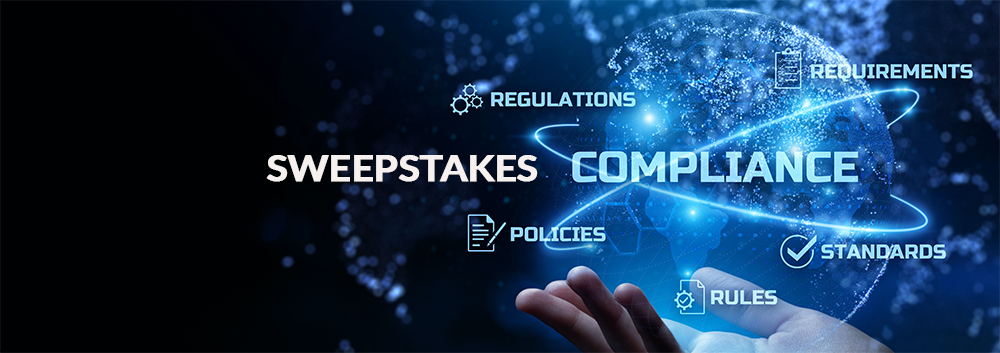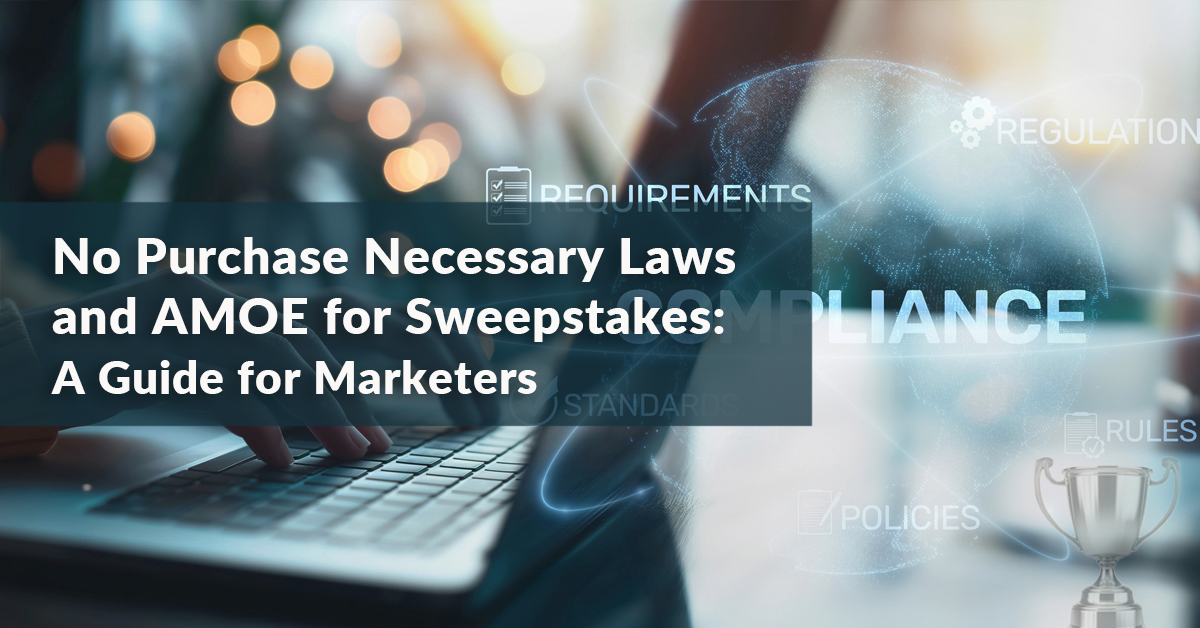Sweepstakes are popular marketing tools that drive engagement, improve brand recognition, and generate excitement about your products or services. 55 million Americans participate in these types of contest every year, making them the perfect opportunity to boost engagement with your customers.
However, running a successful sweepstakes requires more than creative marketing and enticing prizes. It needs a strong legal foundation to ensure you comply with the relevant laws, rules, and regulations.
From eligibility requirements and price restrictions to disclosure obligations, there's a lot to consider. So, we've examined the most important sweepstakes laws and regulations to help you navigate the legal maze. Read on to learn more about:
- Alternate Means of Entry (AMOE)
- No Purchase Necessary Laws (NPN)
- Federal Sweepstakes Laws
- US State Sweepstakes Laws
- Bonding and Registration
What are Sweepstakes?
Sweepstakes are promotional events or campaigns where winners are drawn randomly from among the valid participants. Prizes can range from cash and vacations to products, gift cards, or exclusive experiences.
They employ various entry methods, such as:
- Completing a form
- Sending an email
- Sharing content on social platforms
- Visiting a website
- Watching a video
Generally, sweepstakes rules don't require participants to make a purchase as part of the entry process – as you can see from these sweepstakes examples.
Snipp Tip
Before launching your sweepstakes, double-check every element of the promotion with your lawyer(s). They'll help you get to grips with the relevant rules and regulations, ensuring your promotion complies with local, state, and federal sweepstakes laws.
It's also sensible to partner with an experienced sweepstakes administration company or sweepstakes agency. They provide market expertise and sophisticated software to help you create, launch, and manage promotions at scale.
How to Navigate Sweepstakes Laws and Compliance
It might seem like a complex process, but with careful planning and the right support, your sweepstakes marketing campaigns will meet the necessary rules and regulations. Use this checklist to ensure you don't miss anything.
Familiarize Yourself with Applicable Sweepstakes Laws: Take the time to understand the sweepstakes laws and regulations for your specific jurisdiction. Remember, laws vary from state to state.
Privacy Policy: Provide a link to your privacy policy. Your privacy policy tells participants how you'll collect and use their personal information. It should also contain a comprehensive breakdown of other key details participants need to know, such as the promotion's rules.
Sweepstakes Bonding and Regulation: Some jurisdictions may require registering your sweepstakes with a specific government agency or disclosing certain details to the authorities. For example, New York and Florida need registration and sweepstakes bonding requirements for prizes exceeding $5,000. Similarly, every state has different laws, so make sure your promotion meets regional sweepstakes legal requirements.
Eligibility Requirements: While your policy section would already have eligibility criteria, make sure to clearly communicate factors such as age, residency, and other exclusions in your rules.
Prize Considerations: Familiarize yourself with any tax implications for the winners, and consider consulting legal or financial experts to navigate these complexities. For example, if your sweepstakes offer a trip as a prize, make sure to verify and collect all required documents as needed.
Create Full and Abbreviated Rules: Create rules that outline all the necessary details of your sweepstakes, including entry methods, entry deadlines, eligibility criteria, prize descriptions, and any other restrictions. For example, if you use telemarketing calls to communicate your sweepstakes, they must comply with TSR. If you use telemarketing calls and text messages to communicate your sweepstakes, you must comply with TCPA requirements.
Terms and Conditions: T&Cs are vital components of your sweepstakes campaigns as they outline the rules, regulations, and conditions for participants. Your T&Cs must also include dispute resolutions, privacy and data protection, winner selection and process of contacts, social network disclaimers, sponsors, and other considerations.
Winner Selection and Distribution: Provide a detailed description of the prizes offered in your sweepstakes, including approximate retail values. Explain how winners will be selected through a random drawing, judging panel, or other methods.
Work with Legal Professionals: If you have any concerns about understanding or complying with sweepstakes rules and laws, consult with legal professionals.
Sweepstakes Laws and Requirements
1. Alternate Means of Entry (AMOE)
Alternate Means of Entry, or AMOE, allows customers to participate in sweepstakes if it involves any kind of monetary benefit for the company, like a purchase or donation. The most common alternate entry methods include:
- Online entry forms
- Entry by mail
- Telephone entry
- Entry through social platforms
- In-person entry (e.g., at the store)
- Text message entry
The alternate means of entry should be readily available, free of charge, and not impose any significant burdens on participants compared to those who choose to purchase. Sweepstakes organizers must ensure that the AMOE is fair and doesn't disadvantage participants who opt for the free method of entry.
2. No Purchase Necessary (NPN)
When running sweepstakes, you must be familiar with No Purchase Necessary laws. The law in some states stipulates that, if you're running a sweepstakes, you can't ask participants to make a purchase. Likewise, you can't provide other inducements, like giving participants a greater chance of winning if they make a purchase.
3. Federal Sweepstakes Laws
Your sweepstakes should comply with the Federal Trade Commission’s general advertising guidelines. There's no single federal law that exclusively governs sweepstakes. However, several agencies, including the Federal Trade Commission (FTC), the Federal Communications Commission (FCC), the United State Postal Services (USPS), and the United States Department of Justice (DOJ), apply rules and regulations.
Here are some key federal laws to consider:
- FTC Act: The FTC prohibits deceptive and unfair trade practices and requires certain information, rules, and transparency as regards prizes. It should include basic information about the sponsor, promotion duration, winner selection method, types of prizes, eligibility requirements, T&Cs, liability limitations, and privacy policies.
- Deceptive Mail Prevention and Enforcement Act (DMPEA): This applies only to sweepstakes available through direct emails, and includes best practices for hosting fair promotions.
- Internal Revenue Service (IRS): This law states that the sponsor or the contest is responsible for issuing IRS 1099-Misc. Income tax form to the winner if the prize value exceeds $600.
- CAN-SPAM Act: The CAN-SPAM Act protects the recipient's right to opt out of commercial emails. It requires you to use accurate subject lines, clear messaging, and include an opt-out mechanism.
- California Consumer Privacy Act (CCPA): This act states that California residents have certain rights and control over their personal information. If you collect information on California residents through YouTube sweepstakes, regardless of your business location, you must provide notice about data collection, honor rights to access and delete data, and implement security measures to protect personal information.
- General Data Protection Regulation (GDPR): While GDPR isn't a law in the United States, there are different privacy laws regulated at federal and state levels. For example, it's necessary to disclose how you intend to use and protect participant data.
4. U.S. Sweepstakes Laws
Some states have additional laws or requirements you must comply with. In addition to federal laws, you’ll want to look into the various, state-specific sweepstakes rules and laws to ensure you don’t incur penalties.
Here are some State Laws to consider:
- New York: You must register and bond your sweepstakes 30 days prior to the opening date if the prize value is over $5,000. You must also provide a list of winners to anyone who requests it.
- Ohio: Your sweepstakes mustn't force participants to visit a store unless they have already visited the store to make a purchase or attended a sales presentation.
- Florida: You must register and bond your sweepstakes 7 days before it begins if the total prize is worth more than $5,000. You also need to file the winner list with the state and provide a list to anyone who requests it.
- Maine: You may not collect health-related or personal information from participants under the age of 18 without first obtaining verifiable consent from legal guardians or parents.
- North Dakota: Skill-based sweepstakes are forbidden to include a purchase requirement or other forms of consideration.
- Rhode Island: You must register with the state if the prize pool value exceeds $500 and there's a retail store in the state. Bonding isn't required.
- Tennessee: You can't release the personal information of the winner publicly (in perpetuity).
- Texas: If you're organizing sweepstakes in Texas and the prize is worth than $50,000, you can't automatically enter customers into sweepstakes every time they make a purchase.
All states (both those mentioned above and those not) must follow the general promotion law across the U.S.
5. Sweepstakes Registration and Bonding
Registration and bonding are two important requirements for running sweepstakes, although they may not be required in all jurisdictions. The specific requirements for registration and bonding can vary from state to state within the U.S. Here's a general overview.
Sweepstakes Registration
Sweepstakes registration refers to the process of providing certain information to the appropriate authorities to legally conduct a sweepstakes. Some states require sweepstakes operators to register their promotion with state agencies or disclose specific details about the promotion, such as:
- Start and end dates
- Prize descriptions
- Eligibility requirements
The purpose of registration is to ensure compliance with state regulations and provide transparency to participants.
Sweepstakes Bonding
Sweepstakes bonding involves obtaining a surety bond to financially guarantee the fulfillment of the prizes offered in the sweepstakes. This requirement is primarily aimed at protecting participants by providing a recourse if the operator fails to award the promised prizes. The bond amount is typically based on the total value of the prizes or a predetermined amount set by the governing authority.
It's important to note that not all states require registration or bonding for sweepstakes. Requirements can vary, and some states may have specific thresholds that trigger the need for registration or bonding, such as a certain prize value or the number of participants. Additionally, some states may have alternative requirements or exemptions for certain types of sweepstakes, such as those run by non-profit organizations or small businesses.
To determine the specific registration and bonding requirements for your sweepstakes, it's essential to consult the laws and regulations of the individual states where you'll run it. The regulatory agencies responsible for overseeing sweepstakes promotions can provide guidance and information on the specific requirements in each jurisdiction.
Which states require registration and bonding of sweepstakes?
The requirements for registration and bonding of sweepstakes can vary from state to state. While we can provide a general overview, it's important to consult the specific laws and regulations of each state to determine the requirements for a given sweepstakes.
Here are some examples of states that commonly require registration or bonding. Please note, this doesn't represent legal advice. Please consult your lawyer before running a sweepstakes.
- New York: You must register and bond any sweepstakes with a prize value exceeding $5,000 with the New York Secretary of State's office.
- Florida: Florida requires registration and bonding for sweepstakes with prizes valued over $5,000.
- Rhode Island: You must register a sweepstakes with a prize value exceeding $500 with the Rhode Island Department of Business Regulation. A bond or an alternative form of security may be required.
These are just a few examples, and there may be additional states with registration and bonding requirements. It's crucial to research and consult the specific laws and regulations of each state where you plan to run a sweepstakes to ensure compliance with their requirements. Additionally, regulations and requirements can change over time, so it's important to stay updated with the latest information from the relevant regulatory agencies.
Playing It Safe
Familiarizing yourself with the relevant sweepstakes laws and regulations across different states is important. Complying with the laws can prevent penalties and minimize legal risks. By ensuring transparency, providing clear terms and conditions, and avoiding deceptive practices that can minimize legal risks. Remember: if you're unsure, consult with your legal team and your sweepstakes administration provider. When it comes to compliance, it's always better to play it safe.
Contact us to learn more about how our turnkey, industry-agnostic sweepstakes platform can help you create compelling sweepstakes campaigns to acquire and engage your customers.






